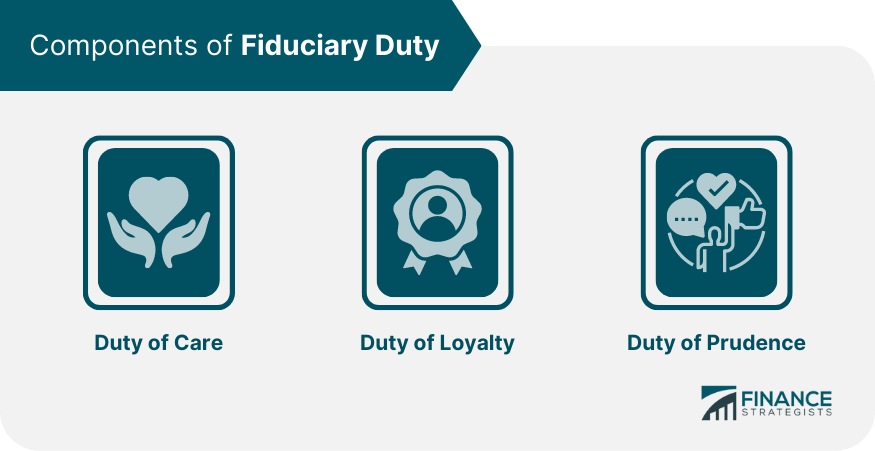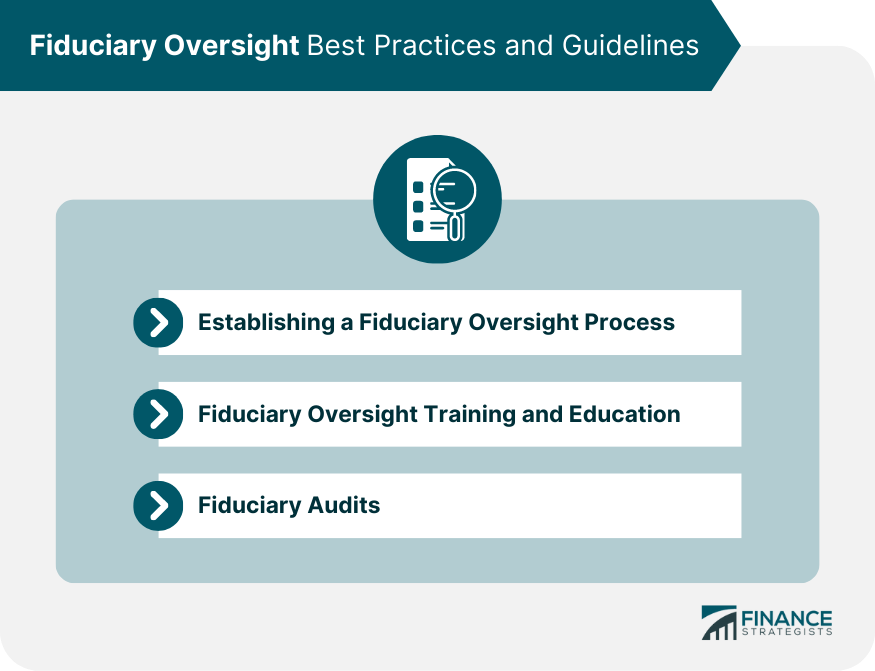Fiduciary oversight is the process of monitoring and managing the actions of individuals or organizations responsible for managing assets or resources held in trust for others. It involves establishing policies and procedures, monitoring compliance, evaluating performance, managing risks, and ensuring accountability. The goal of fiduciary oversight is to ensure that fiduciaries act in the best interests of their beneficiaries and fulfill their legal and ethical obligations. A fiduciary duty is the highest standard of care imposed by law, requiring fiduciaries to act in their client's best interests. There are three primary components of fiduciary duty: Duty of Care: A fiduciary must exercise the highest level of care, skill, and diligence when providing services to their clients. Duty of Loyalty: A fiduciary must act solely in their client's best interests, placing the client's interests above their own. Duty of Prudence: A fiduciary must make prudent investment decisions and consider the client's unique needs and objectives. A fiduciary relationship is a legal relationship between a fiduciary and their client, which includes the following aspects: Roles and Responsibilities: A fiduciary manages their client's assets, provides financial advice, and ensures compliance with all applicable laws and regulations. Establishing a Fiduciary Relationship: A fiduciary relationship is established when a client entrusts their assets or financial decision-making to a professional who agrees to act in the client's best interests. Conflicts of interest can arise when a fiduciary's personal interests or professional relationships compromise their ability to act in their client's best interests. It is essential for fiduciaries to: Identify Conflicts of Interest: Fiduciaries must recognize situations where conflicts of interest may arise and take appropriate action. Mitigate Conflicts of Interest: Fiduciaries should establish policies and procedures to minimize or eliminate conflicts of interest and, when necessary, disclose them to clients. Full and fair disclosure is a cornerstone of fiduciary oversight, ensuring that clients are well-informed about the services they receive and the associated risks. Importance of Full and Fair Disclosure: Fiduciaries must provide accurate, complete, and timely information to clients, allowing them to make informed decisions. Communication With Clients: Fiduciaries should maintain open lines of communication with clients, addressing their questions and concerns promptly and transparently. Investment fiduciaries manage clients' investment portfolios and provide investment advice. Effective fiduciary oversight in investment management includes: Roles and Responsibilities of Investment Fiduciaries: Investment fiduciaries must exercise due diligence in selecting investments, monitor portfolio performance, and provide ongoing advice and recommendations. Best Practices in Investment Fiduciary Oversight: Investment fiduciaries should adopt a systematic approach to managing risk, establish clear investment objectives, and document their decision-making processes. Retirement plan fiduciaries are responsible for managing employer-sponsored retirement plans, such as 401(k)s and pension plans. Key aspects of fiduciary oversight in retirement planning include: The Role of Fiduciaries in Retirement Plans: Fiduciaries must select and monitor plan investment options, ensure compliance with applicable laws and regulations, and provide participants with the necessary information to make informed decisions. Best Practices in Retirement Plan Fiduciary Oversight: Retirement plan fiduciaries should regularly review and assess plan performance, evaluate fees and expenses, and provide ongoing education and communication to plan participants. Trust and estate fiduciaries are responsible for managing assets held in trust or as part of an estate. Key components of fiduciary oversight in trust and estate management include: Roles and Responsibilities of Trust and Estate Fiduciaries: Trust and estate fiduciaries must manage assets in accordance with the terms of the trust or estate, protect beneficiaries' interests, and ensure compliance with tax and legal requirements. Best Practices in Trust and Estate Fiduciary Oversight: Trust and estate fiduciaries should maintain detailed records, provide regular accountings to beneficiaries, and communicate openly and transparently with all interested parties. Fiduciary oversight is also essential in the broader banking and financial services industry, where professionals provide financial advice and manage client assets. Key aspects of fiduciary oversight in banking and financial services include: Fiduciary Oversight in Banking: Banks must adhere to strict fiduciary standards when managing client assets, providing trust services, or offering investment advice. Best Practices in Financial Services Fiduciary Oversight: Financial services professionals should maintain a client-centric focus, ensure transparency in fees and compensation, and consistently act in their client's best interests. Several laws and regulations govern fiduciary oversight in the United States, including: The Investment Advisers Act of 1940: This act regulates investment advisers and establishes fiduciary duties for those providing investment advice. Employee Retirement Income Security Act (ERISA): ERISA sets standards for retirement plan fiduciaries and requires them to act in the best interests of plan participants. The Dodd-Frank Wall Street Reform and Consumer Protection Act: This legislation addresses various aspects of the financial industry, including the fiduciary responsibilities of financial advisers. Other Relevant Regulations: State laws, industry-specific regulations, and self-regulatory organizations also shape fiduciary oversight requirements. Several regulatory agencies oversee fiduciary conduct in the financial industry, including: The Securities and Exchange Commission (SEC): The SEC enforces federal securities laws, including those governing investment advisers and their fiduciary duties. The Department of Labor (DOL) oversees ERISA and its fiduciary requirements for retirement plan sponsors and fiduciaries. Financial Industry Regulatory Authority (FINRA): FINRA is a self-regulatory organization that enforces rules and standards for broker-dealers, including their fiduciary obligations. Other Relevant Regulatory Agencies: State and industry-specific regulators also oversee fiduciary conduct and ensure compliance with applicable laws and regulations. A robust fiduciary oversight process includes the following: Assessing Fiduciary Risks: Fiduciaries should thoroughly analyze potential risks associated with their services and implement appropriate risk management strategies. Implementing a Fiduciary Oversight Framework: Fiduciaries should develop and maintain a comprehensive framework to monitor and evaluate their fiduciary responsibilities and performance. Monitoring and Evaluating Fiduciary Performance: Fiduciaries must regularly review and assess their performance to ensure they continue to meet their fiduciary obligations. Ongoing training and education are crucial for maintaining high fiduciary standards: The Importance of Ongoing Training and Education: Fiduciaries must stay current on industry developments, regulatory changes, and best practices to effectively serve their clients and comply with their fiduciary duties. Resources for Fiduciary Education and Training: Fiduciaries should use professional development opportunities, such as conferences, seminars, webinars, and industry publications, to enhance their knowledge and skills. Fiduciary audits play a vital role in ensuring compliance with fiduciary standards and identifying areas for improvement: The Role of Audits in Fiduciary Oversight: Audits help fiduciaries identify potential issues and weaknesses in their fiduciary oversight processes and implement corrective actions as needed. Internal and External Audits: Fiduciaries should conduct both internal audits, which are performed by the organization itself, and external audits, which are conducted by independent third parties, to ensure a comprehensive assessment of their fiduciary practices. The Audit Process: The audit process typically involves a review of policies and procedures, an examination of fiduciary records and documentation, interviews with key personnel, and an assessment of the effectiveness of the fiduciary oversight process Fiduciary oversight is the process of monitoring and managing the actions of individuals or organizations responsible for managing assets or resources held in trust for others. It involves establishing policies and procedures, monitoring compliance, evaluating performance, managing risks, and ensuring accountability. The key concepts of fiduciary duty, fiduciary relationship, conflicts of interest, and disclosure and transparency are crucial to effective fiduciary oversight. Fiduciary oversight is important in different financial sectors, including investment management, retirement planning, trust and estate management, and banking and financial services. The regulatory and legal framework governing fiduciary oversight is also essential, and several regulatory agencies oversee fiduciary conduct in the financial industry. Best practices for establishing a fiduciary oversight process, ongoing training and education, and fiduciary audits are critical to maintaining high fiduciary standards and ensuring compliance with fiduciary duties. Ultimately, effective fiduciary oversight is necessary to ensure that fiduciaries act in the best interests of their beneficiaries and fulfill their legal and ethical obligations.What Is a Fiduciary Oversight?
Key Concepts in Fiduciary Oversight
Fiduciary Duty

Fiduciary Relationship
Conflicts of Interest
Disclosure and Transparency
Fiduciary Oversight in Different Financial Sectors
Investment Management
Retirement Planning
Trust and Estate Management
Banking and Financial Services
Regulatory and Legal Framework Governing Fiduciary Oversight
Key Regulations and Laws
Regulatory Bodies and Their Roles in Fiduciary Oversight
Fiduciary Oversight Best Practices and Guidelines
Establishing a Fiduciary Oversight Process
Fiduciary Oversight Training and Education
Fiduciary Audits

Conclusion
Fiduciary Oversight FAQs
Fiduciary oversight refers to the process of monitoring and managing the actions of individuals or organizations responsible for managing assets or resources held in trust for others.
Fiduciary oversight is typically the responsibility of the board of directors, trustees, or other organization governing bodies with fiduciary duties.
The key elements of fiduciary oversight include establishing policies and procedures, monitoring compliance, evaluating performance, managing risks, and ensuring accountability.
Fiduciary oversight is crucial to ensure that fiduciaries act in the best interests of their beneficiaries and fulfill their legal and ethical obligations. It helps prevent fraud, mismanagement, and other abuses of trust.
Organizations can improve their fiduciary oversight by implementing robust governance structures, establishing clear policies and procedures, conducting regular audits, and providing training and education to fiduciaries and stakeholders.
True Tamplin is a published author, public speaker, CEO of UpDigital, and founder of Finance Strategists.
True is a Certified Educator in Personal Finance (CEPF®), author of The Handy Financial Ratios Guide, a member of the Society for Advancing Business Editing and Writing, contributes to his financial education site, Finance Strategists, and has spoken to various financial communities such as the CFA Institute, as well as university students like his Alma mater, Biola University, where he received a bachelor of science in business and data analytics.
To learn more about True, visit his personal website or view his author profiles on Amazon, Nasdaq and Forbes.











